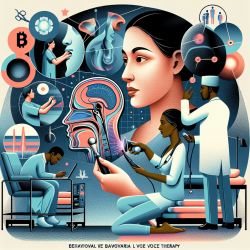Understanding COOK Technology: A Cognitive Orthosis for Meal Preparation
The research article "Using a cognitive orthosis to support older adults during meal preparation: Clinicians’ perspective on COOK technology" provides valuable insights into how assistive technologies can aid older adults with cognitive impairments. As practitioners in the field of special education and therapy, it is crucial to explore how such technologies can be integrated into our practices to enhance the independence and safety of our clients.
Key Findings from the Research
The study highlights the potential of COOK, a cognitive orthosis designed to assist older adults during meal preparation. The technology offers support through a touch screen interface installed next to the stove, which guides users through the meal preparation process while ensuring safety by correcting risky behaviors.
According to occupational therapists involved in the study, COOK is particularly beneficial for individuals with mild cognitive impairment (MCI), as they have better learning abilities compared to those with Alzheimer's disease. The technology's ability to provide explicit guidance and manage potential critical errors makes it a valuable tool for enhancing task performance and safety.
Practical Implications for Practitioners
For practitioners, the study suggests several ways to implement COOK technology effectively:
- Target Audience: Focus on clients with mild cognitive impairment who can benefit most from the technology's learning support features.
- Customization: Customize the interface and features of COOK to match the specific cognitive and sensory needs of each client.
- Interdisciplinary Collaboration: Work closely with an interdisciplinary team, including family members, to ensure a comprehensive approach to implementing COOK in clients' daily routines.
- Training and Support: Provide thorough training and ongoing support to clients and their families to maximize the benefits of COOK technology.
Encouraging Further Research and Exploration
The study also emphasizes the need for further research to refine COOK technology and adapt it for broader use among individuals with Alzheimer's disease. Practitioners are encouraged to participate in research initiatives and contribute their clinical insights to enhance the development of assistive technologies.
By staying informed about the latest advancements in cognitive orthoses and engaging in collaborative research efforts, practitioners can play a pivotal role in advancing the field of assistive technology for cognitive impairments.
To read the original research paper, please follow this link: Using a cognitive orthosis to support older adults during meal preparation: Clinicians’ perspective on COOK technology.










